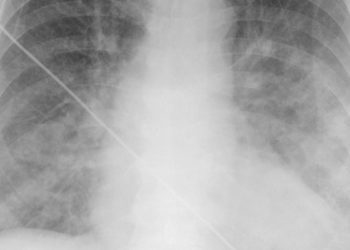Renin-angiotensin system inhibition following transcatheter aortic valve replacement linked with lower cardiac mortality
1. Use of medications to inhibit the renin-angiotensin system (RAS) following transcatheter aortic valve replacement (TAVR) for severe aortic stenosis linked with reduced cardiac mortality at 3 years.
2. RAS inhibition was also demonstrated to have a greater reduction in ventricular volume and septal hypertrophy on follow-up echocardiogram.
Evidence Rating Level: 2 (Good)
Study Rundown: The use of transcatheter aortic valve replacement (TAVR) for severe aortic stenosis has become more common, with improved clinical outcomes in patients at intermediate- or high-risk for surgery. Aortic stenosis is often associated with adverse cardiac remodeling and fibrosis which may persist despite the correction of the mechanical defect with valve replacement. The adverse remodeling has been linked with poorer outcomes following TAVR, but the impact of medical therapy is not clear. The current study sought to evaluate the impact of renin-angiotensin system (RAS) inhibition on clinical and echocardiographic outcomes following TAVR in patients with aortic stenosis. The retrospective analysis found that use of RAS inhibitors in this population was linked with lower cardiac mortality at 3-years and reduced left ventricular volume and hypertrophy. Use of RAS inhibitors was also associated with reduced rates of atrial fibrillation, cerebrovascular events, and readmissions.
The findings of this study provide support for a randomized clinical trial to confirm the cardioprotective effects of these medications following TAVR. The main strength of the study is the large population of patients undergoing TAVR with serial echocardiographic and clinical follow-up. The main limitations of the study stem from the retrospective design with differences in baseline comorbid conditions between those who were and were not on RAS inhibitors.
Click to read the study in JACC
Relevant Reading: Association of Renin-Angiotensin Inhibitor Treatment With Mortality and Heart Failure Readmission in Patients With Transcatheter Aortic Valve Replacement
In-Depth [retrospective cohort]: This study was a retrospective analysis of prospectively collected data from the RASTAVI (Renin-Angiotensin System Blockade Benefits in Clinical Evolution and Ventricular Remodeling After Transcatheter Aortic Valve Implantation) registry. The study included 2866 consecutive patients undergoing TAVR for severe AS at 10 institutions. Patients were considered to be on RAS inhibition if they were on one of the following medications at discharge: angiotensin converting enzyme inhibitors, angiotensin-receptor blockers (with or without sacubitril), spironolactone or eplerenone. Those who died during the index hospitalization were excluded from analysis.
Of the 2785 patients included in the study 1622 were discharged on RAS inhibitor therapy. Following adjustment for baseline differences, there was no observed difference in overall mortality (14.5% vs. 15.3% in patients taking and not taking RAS inhibitors, respectively; p = 0.577), but RAS inhibition was linked with lower cardiac mortality at 3 years (9.3% vs. 5.6%; p < 0.001). At 3 years of follow-up 85.5% had echocardiographic re-evaluation with those on RAS inhibitors having greater reduction in ventricular volume and septal hypertrophy (p < 0.001).
Image: PD
©2019 2 Minute Medicine, Inc. All rights reserved. No works may be reproduced without expressed written consent from 2 Minute Medicine, Inc. Inquire about licensing here. No article should be construed as medical advice and is not intended as such by the authors or by 2 Minute Medicine, Inc.







